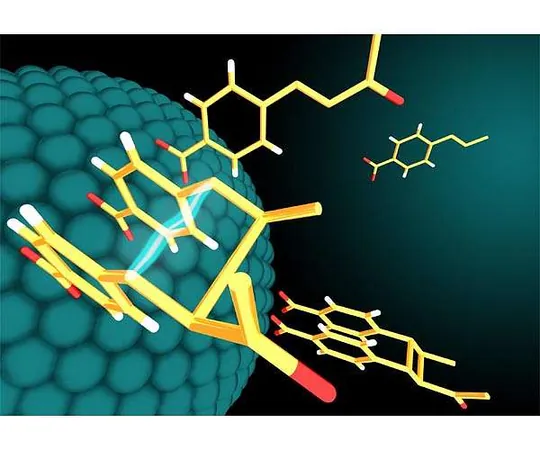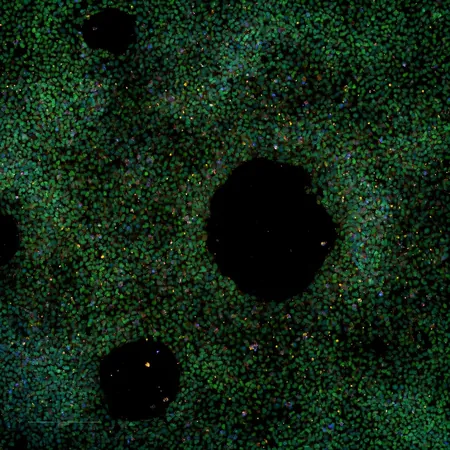
Revolutionary Bioactive Compounds from Andean Hot Springs Could Change the Game for Food and Pharma Industries!
2025-01-19
Author: Wei
Groundbreaking Discovery in Chile's Central Andes
A groundbreaking discovery in the heart of Chile's central Andes has unveiled bioactive compounds produced by unique bacteria from the El Medano hot springs, revealing their tremendous potential as natural additives in the pharmaceutical and food industries. This significant research was published in the journal *Scientific Reports* and has piqued the interest of scientists and industry experts alike.
The Star of the Study: Exopolysaccharide (EPS)
The star of the study is an exopolysaccharide (EPS) derived from the resilient Med1 strain of *Pseudomonas alcaligenes*, a bacterium that flourishes in extreme conditions, tolerating temperatures between 34°C and 44°C. This EPS constitutes a network of extracellular carbohydrate polymers that not only shields the bacterial cells in these harsh environments—characterized by elevated temperatures, acidic pH levels, and high metal concentrations—but also boasts multiple industrial applications.
Natural Bioactive Compounds: A Sustainable Alternative
As the world increasingly demands natural bioactive compounds, EPSs are being recognized for their invaluable structural and functional properties. They present a sustainable alternative to synthetic additives, outshining traditional plant-derived polysaccharides by offering a more diverse array of physicochemical traits and biological functionalities. These include remarkable antiviral, antitumor, immunoregulatory, antioxidant, and emulsifying effects as well as flocculation abilities that are essential for various industries including food, cosmetics, biomedical materials, and wastewater treatment.
Strategic Study in Maule Region
"Choosing to study the hot springs in Chile's Maule region was strategic because they remain largely undeveloped in terms of harnessing biotechnologically valuable compounds resistant to environmental stress," stated Joao Paulo Fabi, a professor at the University of Sao Paulo's School of Pharmaceutical Sciences and co-author of the study.
Collaborative Research Effort
In this collaborative research effort, experts from Brazil, Chile, the United States, and Iraq joined forces to isolate the bacterium from hot spring water, sequence its genome, and optimize EPS production at elevated temperatures. Surprisingly, the strain demonstrated optimal growth at 37°C, managing to withstand temperatures of up to 44°C—conditions that usually deter harmful microorganisms during production processes.
Meticulous Study of EPS
The comprehensive study involved meticulous physical and chemical characterization of the EPS and evaluation of its technological applications. With the assistance of Aparna Banerjee from the Autonomous University of Chile, researchers explored the EPS’s unique structural properties, thermal stability, and significant activities such as antioxidant effects and flocculation.
Conclusion and Future Prospects
“The conclusion is clear: the EPS produced by *P. alcaligenes* Med1 is an exceptional candidate for applications in food and pharmaceuticals as a natural additive,” Fabi remarked, adding that while further testing and regulatory approvals are still necessary for commercial applications, the EPS provides a promising, eco-friendly alternative to synthetic additives.
Paving the Way for Sustainable Solutions
This pioneering research not only sheds light on optimizing EPS production but also emphasizes the bioactivity of these compounds, paving the way for more sustainable solutions across diverse sectors, including food, cosmetics, and pharmaceuticals.
An Exciting Possibility
As industries begin to embrace natural additives for their benefits to health and the environment, the time is ripe for exploration and innovation. Could this discovery from Chilean hot springs be the key to transforming the way we think about ingredient sourcing? It's an exciting possibility, and the implications for future research could be nothing short of revolutionary!



 Brasil (PT)
Brasil (PT)
 Canada (EN)
Canada (EN)
 Chile (ES)
Chile (ES)
 Česko (CS)
Česko (CS)
 대한민국 (KO)
대한민국 (KO)
 España (ES)
España (ES)
 France (FR)
France (FR)
 Hong Kong (EN)
Hong Kong (EN)
 Italia (IT)
Italia (IT)
 日本 (JA)
日本 (JA)
 Magyarország (HU)
Magyarország (HU)
 Norge (NO)
Norge (NO)
 Polska (PL)
Polska (PL)
 Schweiz (DE)
Schweiz (DE)
 Singapore (EN)
Singapore (EN)
 Sverige (SV)
Sverige (SV)
 Suomi (FI)
Suomi (FI)
 Türkiye (TR)
Türkiye (TR)
 الإمارات العربية المتحدة (AR)
الإمارات العربية المتحدة (AR)